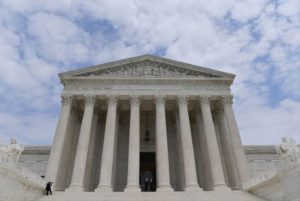
The Trump administration’s efforts to force state and local authorities to abandon “sanctuary” policies and cooperate with federal immigration agents have mostly been panned by lower courts, and the Supreme Court soon may weigh in.
One justice — albeit one no longer on the high court — already has. Retired justice David H. Souter last week joined a unanimous panel of the U.S. Court of Appeals for the 1st Circuit ruling that the Justice Department lacks the legal authority to withhold federal crime-fighting grants from local law enforcement agencies to compel such cooperation.
The law “simply does not allow the DOJ to impose by brute force” immigration enforcement duties that states and localities do not want to perform, wrote Judge Bruce M. Selya, a Ronald Reagan nominee. Souter, chosen for the Supreme Court by President George H.W. Bush, joined Selya and Judge David J. Barron, who was nominated by President Barack Obama. “The DOJ’s contentions stretch the statutory language beyond hope of recognition,” Selya wrote.
The Supreme Court has already heard arguments about whether the administration illegally tried to repeal Obama’s DACA program. A decision could come at any time.
And a separate but related “sanctuary” case from California already is under consideration by the justices. The administration is challenging a California law that generally instructs law enforcement not to cooperate with federal immigration agents, such as by refusing requests for notifications about when immigrants might be released from custody.
The law was passed just after Trump took office but has newfound importance as concerns over the coronavirus outbreak have prompted local officials to want to thin the detained population.
A panel of the U.S. Court of Appeals for the 9th Circuit agreed with a district judge who ruled for California, rejecting the administration’s argument that the lack of cooperation undermines federal immigration policy.

Recent Comments